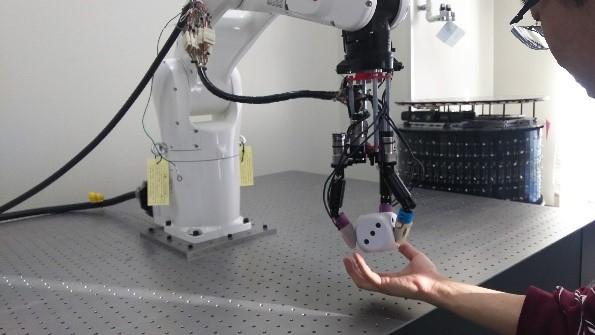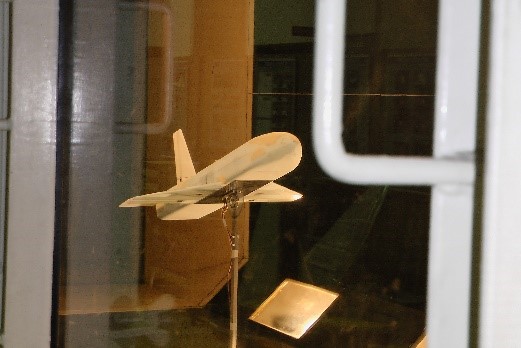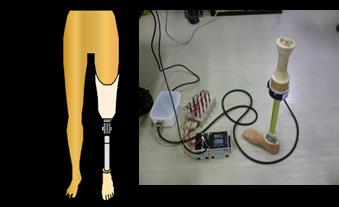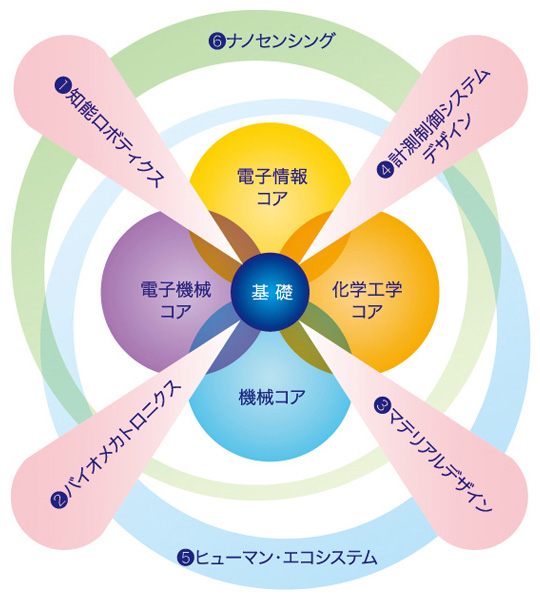Features of the School
With technical innovation progressing rapidly, there is a demand for competent engineers who will lead the way in the society of the future by combining the knowledge and skills they have acquired in various fields of engineering. In the School of Frontier Engineering, we design programs for acquiring this competence without a system of courses. Firstly, students study in core programs that correspond to conventional disciplines (Electronic Machines, Machines, Chemical Engineering and Electronic Information), and then they advance to six frontier programs: Intelligent Robotics, Biomechatronics, Material Design, Measurement & Control System Design, Human Eco-System and Nano-Sensing. They integrate these programs to open up an unknown field (frontier) beyond the conventional engineering framework.
Introduction
Outline
Let’s develop cutting-edge technology that will support the society of the near future by integrating engineering. Our future society will be created by frontier spirits!
In order to create an advanced and safe near-future society, we will produce engineers and researchers who will open up unknown fields (frontiers) ranging from the nanotechnology to cosmic space. They will develop engineering by combining their knowledge and skills in the fields of mechanical engineering, chemical engineering and electronic information engineering.
Our Principles and Goals
In engineering fields such as robotics, self-driving cars, mechatronics, nano-technology, material technology and IT, there is a great deal of anticipation with regard to innovators who will create an advanced and safe near-future society by combining various types of knowledge. Meanwhile, in the academic fields, segmentation and sophistication are progressing, and it is difficult for a conventional university education to foster a frontier spirit in students while maintaining their expertise. In other words, in order to produce graduates who can adapt easily to advanced technology that involves the integration of disciplines, we must do away with the framework of disciplines. Conventional engineering education based on accumulation (repetition) of knowledge and skills can no longer meet the needs of society.
To solve this problem, it is necessary to introduce an innovative curriculum and education system, and establish a system whereby students develop expertise voluntarily and actively beginning in their first year of university. We aim to develop innovations that will be required in the near future, and we will accomplish this by integrating disciplines beyond the framework of engineering fields. Our graduates will become experts in advanced technology, and will play an active role on the leading edge. We established the School of Frontier Engineering to enable students to engage in their specialized areas of study voluntarily and actively right from their first year of university.
Intelligent Robotics Program
Our graduates will be capable of developing intelligent machines such as robots, using knowledge and skills in fields ranging from machine engineering to electronic information. Students acquire knowledge and skills in the fields of mechanical engineering and electrical engineering, as well as electronic and information engineering, to analyze and design mechanical systems for automation, and develop control and measurement systems. We will develop artificial intelligence for robots and mobility- and aerospace-related machines, and cultivate the flexible and bold way of thinking that is required to achieve breakthroughs in technical innovation.


Biomechatronics Program
Students will learn about technology that supports people in their daily lives, and the process for applying it in society to promote safety, comfort and convenience. They will also acquire the skills to apply technology to human-related mechanical engineering. The knowledge they acquire will be used to support people in fields ranging from machine measurement and control fields such as mechanical engineering and control engineering, to biomedical engineering fields such as human science and ergonomics. In addition, we will equip students with skills for application of people-centered technology such as medical and welfare equipment and assistive equipment, as well as a wide range of knowledge and problem-solving skills to develop people-oriented machines.


Material Design Program
Students will learn about manufacturing, with a focus on chemistry and mechanics that create new materials, chemical products and nano-materials to support people’s lives and health. We aim to produce graduates with innovative ideas for designing materials with diverse uses. In order to understand the functions of materials and their production process, students will learn the properties of materials, theory and analysis methods, as well as industrial applications based on chemical engineering and mechanical engineering. We produce engineers and researchers who will develop new materials and equipment made with those materials.


Measurement & Control System Design Program
We equip students with the application and development skills for measuring the state of people, machines and systems with high sensitivity and accuracy, and for developing systems to control them. Students also learn new system configuration and optimization methods, involving combining information networks, which is an area that is progressing rapidly. This program includes subjects related to the principles of measuring and control equipment, and the designing and application of measuring systems. We will produce engineers and researchers who will design systems combining various devices, conduct industrial application, and work in research and development, with their knowledge of the principles and application of measuring and control systems as a basis.


Human Eco-System Program
This program provides students with the basic scientific and engineering knowledge and skills for exploring human- and environment-friendly technology, and environmental safety.
Through the study of people-related subjects such as ergonomics and bio-instrumentation, and ecosystem-related subjects such as electrochemistry, material circulation engineering and energy conversion engineering, students will acquire knowledge about advanced manufacturing, the functions of human beings, living things and materials, as well as effective use of energy and environmental safety.


Nano-Sensing Program
Sensing technology that detects and analyzes the state of living organisms, materials and machines is indispensable for maintaining human life, advanced technology and the smart society of the near future. Students learn about topics ranging from the principles and design concept of sensing technology to industrial applications such as device design, environment measurement and bio-instrumentation with regard to state-of-the-art technology with a high resolution of nano-order (10-9 m) and advanced sensing technology. Our graduates will research and develop various types of sensors, devices and analysis equipment, as well as equipment and systems using sensors.




